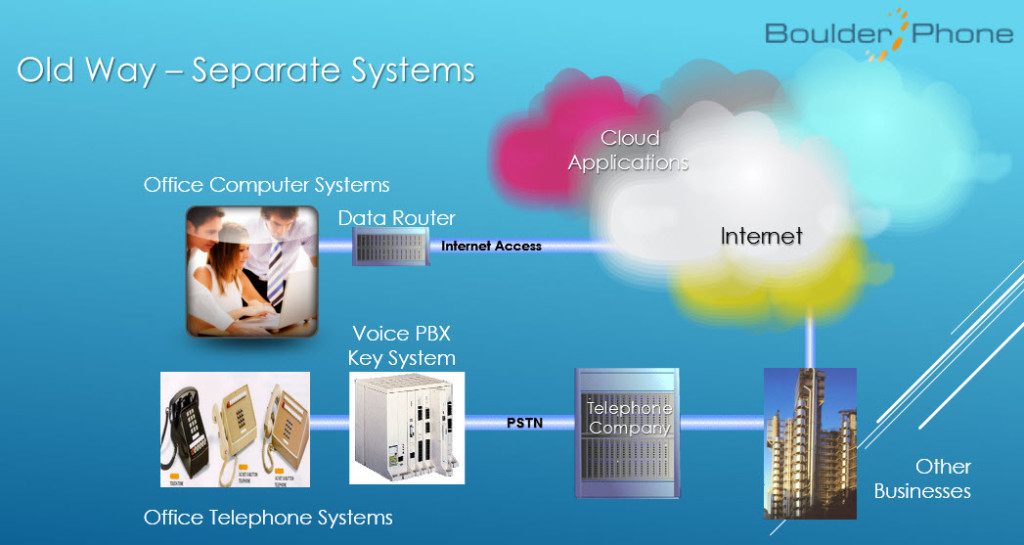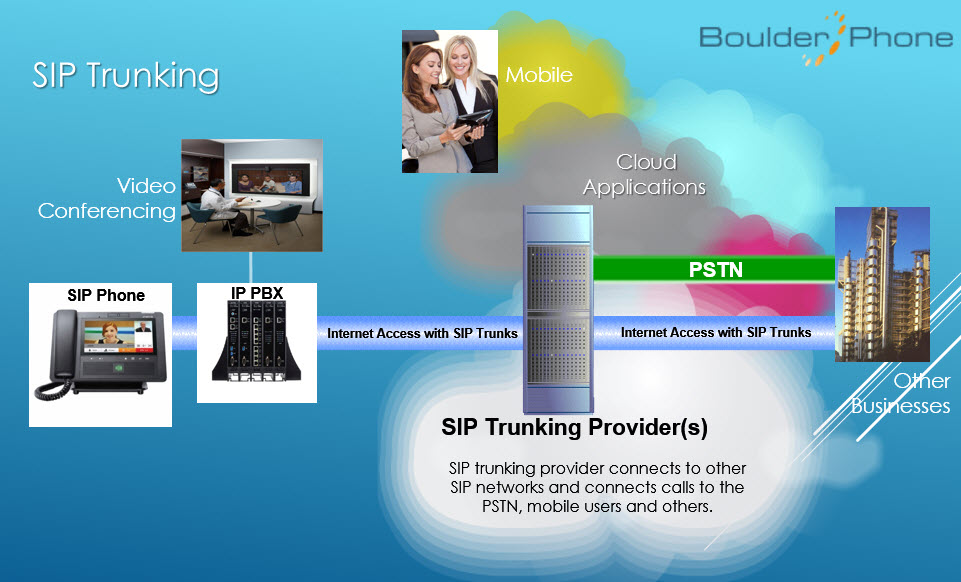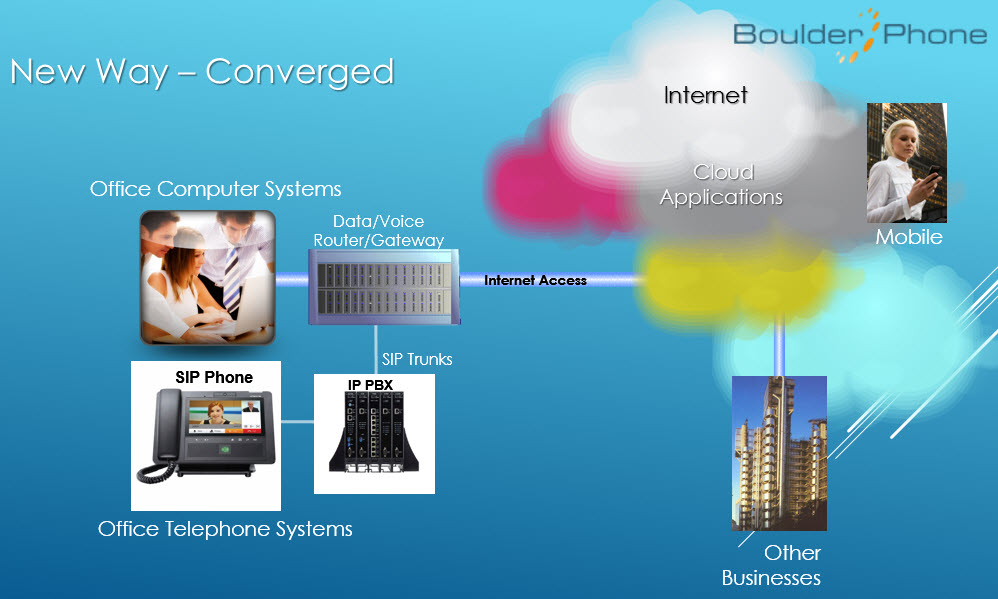Cloud
|
Boulder Phone is excited to inform you about emerging communication trends. Most business telephones today usually only work on specific telephone systems and are only connected to the PSTN (Public Switched Telephone Network). Click on any image for even larger view.  In addition, most business communications and PBX (private branch exchange) telephone systems support only a limited set of digital and IP (internet protocol) telephones. This means customers are limited in their choices of telephones (endpoints) and other devices. Then along came the internet. The Internet uses routers and switches placed at customer locations and network data centers to provide routing and switching much like trains and boxcars. The Internet supports SIP (Session Initiation Protocol) which is used for business telephone communications instead of the PSTN network and supports a wider range of telephones.  Today, there are many practical applications of SIP for business communications including mobile integration, telecommuting, branch office, contact centers, audio/video conferencing and other innovative systems. In the future, all kinds of devices will be connected to the Internet and interconnected with other devices including health care monitors, building systems monitors and others. If you would like details on how SIP communications can benefit your business please call David at 303-442-5500 or email david@boulderphone.com and we are on our way to helping you with tech and business solutions.
Is it time to get your Phones from the Cloud? There is a lot of hype today around this business of cloud based phones. You may hear it called VoIP or Hosted Phone service. Boulder Phone describes this type of service as Internet based phones: that is, your phones are connected to each other through your broadband connection(s). Your system lives on the internet, its set-up and control is in the cloud and the phone is on your desk, in your pocket, at your home, or in your computer. For the right application these phones can be the bees knees. While you need phones, voicemail to email, audio conferencing, and mobility in your business you might not want to buy a phone system that is installed at your office. Perhaps you are a start up or you’re moving to temporary quarters, or you don’t feel settled enough in your business to invest in a premises based phone system. In theses situations one of the best options today is cloud based phone service. Boulder Phone can help you find an experienced cloud based phone provider and get your phones set up and running. Your job will be to choose the right kind of phones and to define some basic ways that calls come into your offices. Note that right kind of internet connection is important as your voice, data, and video all share the same pipe and need to play nice together. If not, you will get the gargling or choppy sound that degrades a conversation. Of course it always boils down to costs. Cloud based phones are great because you select your provider and a monthly cost that fits your budget off you go. They send you phones, you and/or Boulder Phone gets them set up and working, and quickly you focus on the business of your business. Cloud based phones from Polycom, Cisco, Grandstream and others give you choices that fit your style and budget. What does this cost and how does it compare when you buy your own phone system? I like to look at it like leasing a car versus buying a car. Each has its advantages and disadvantages but in either case it’s all going to be shiny and new at the start. Cloud based phone are billed any number of ways but usually monthly, on a per user basis. This may or may not include the cost of the phone. Currently the cost per user is in the $20 – $30 range and as an example a 15 person office would pay $300 – $450 per month ($3600 – $5400 per year) for service in addition to the cost of internet access. This is an ongoing operating cost that as part of the company’s annual budget. Phone and feature upgrades are available as part of this service. In the short term this cost is always less than the cost of buying a premises based system and paying for associated phone lines. It is a simple and easy way to enjoy phones as a service. The capital investment into the phone system achieves its best value when held and used for the full life of the system; usually either side of ten years. With equipment leasing and the advent of SIP trunks (aka: internet phone lines), hardware based phone systems are competitive over the long term, including cost reduction upon lease completion and choice of phone lines without having to purchase new phones. It your choice Boulder Phone is in the business of voice communications and wants to work WITH you to have the system that works FOR you. We have spent 30 years selling systems back up with focused, local service. As we broaden our focus, we recognize the changing landscape and want to support you with cloud based systems too.
Cloud vs. Customer Location Business Voice Communications
40+ Comparisons
Before you buy VoIP-voice over internet protocol, Cloud Voice, Cloud Communications, internet telephony or other telephone/PBX system we ask you to call Boulder Phone at 303-444-4687 (voip) and let us walk you through the issues without obligation to buy from us, This is a comparison of two approaches to business voice communications today: in-office or in-the-cloud. We’ll try our best to limit the techno-babble language while listing dozens of factors involved. Traditionally, businesses had PBXs (private branch exchanges) and key phone systems which were the interface between your business and the telephone company. These systems allowed intercom dialing between users, transfers of any call, call control to limit long distance calling, billing management to track calls, voice mail messages, and more. Today, with internet telephones, users can make calls via the internet using office computers, generic IP telephones while using the bandwidth you already have for your data networking. In reviewing more than 20 papers on this topic and drawing on two decades of experience, we have found that there is great confusion on cloud, hosted, VoIP, internet telephone, CTI-computer telephony integration and other terms used. Essentially, each of these concepts uses the internet for voice just like your web searches, videos, and email. That is, the same internet bandwidth “pipe” can be used for voice, data, video, web surfing and everything else. Instead of having two or more pipes for voice, data, POS-point of sale, security, FAX and other communications, you consolidate your uses into fewer of them. Separate pipes can be good for route diversity, a separate FAX line and/or an emergency when the internet and/or power fail. Here is a running list of Cloud versus Premises based voice services. They are presented in random order as your priorities and preferences are not the same for any order we would present:
Bottom-line – Every business is different with specialized needs. Manufacturing, education, hospitals, and other business environments can have very complex and even regulatory-driven requirements. Cloud or Customer Premises based voice communications are designed for specific applications based on the cost, benefit, need, and want. Each offers unified communications (UC) that have been evolving over the past 20 years and promise only to get better. With more than 500 UC providers & carriers, you can get your UC from another continent! But everything has to work across the enterprise from the desk, to the computer, to the mobile phone, to the IT integration. The critical factor in cars, mobile devices, computers, phones and other devices is getting them installed properly so that they can grow/contract and change as you do, with the ability to get them serviced in a timely fashion. Footnote:
(1) Bandwidth for UC is often overlooked as customers generally already have bandwidth they don’t completely use. Most UC providers leverage this expectation and let the customer figure it out when calls start to “jitter”, echo, or gargle. These QoS (Quality of Service) issues must be taken into account. Yes, UC can scale up and use that extra bandwidth but you don’t want the CEO to have a garbled call with an investor or customer.
Boulder Phone is proud of the many business voice and cabling projects we have built for Boulder businesses with state of the art comprehensive cabling architecture that accommodates communication needs for audio, voice, data, and video both now and for years to come.
|
||||||||||||||||||||||||||||||||||||||||||||||||||||||||||||||||||||||||||||||||||||||||||||||||||||||||||||||||||||||||||||||
|
Email anytime david@boulderphone.com or 303-442-5500.
|
||||||||||||||||||||||||||||||||||||||||||||||||||||||||||||||||||||||||||||||||||||||||||||||||||||||||||||||||||||||||||||||


